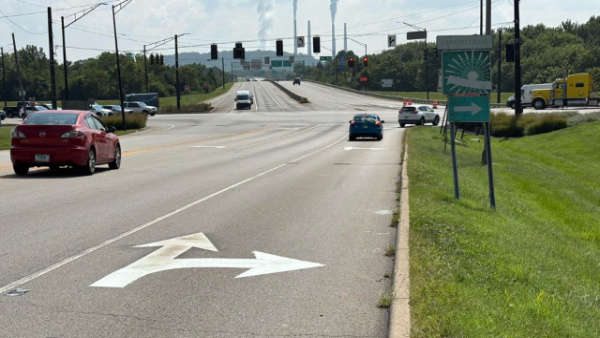Dearborn County Hospital in Lawrenceburg.
file photo
(Cincinnati, Oh.) - Many tri-state hospitals part of the Greater Cincinnati Health Council will start a program to drug test expectant mothers.
Dearborn County Hospital, Saint Elizabeth Healthcare hospitals, UC Health, Mercy Health, TriHealth’s Good Samaritan and Bethesda North hospitals, and several others will begin the mandatory testing program, possibly by September 1.
Dearborn County Hospital has not set a start date for the program, said DCH Community Relations Director Anita Benning in confirming that the hospital will participate in the mandatory testing.
Becky Walter, Communications Director for Margaret Mary Health, said the hospital typically does follow GCHC guidelines, but has not fully committed yet. The hospital will review the policy with its obstetrics physicians sometime in August, Walter said. There are also concerns that mandatory testing would violate a patient's rights. Indiana's laws vary from Ohio's and the hospitals lawyers will review those implications, Walter said.
The health council policy is in response to an alarming trend. The GCHC reports the number of drug dependent babies being born in the region has quadrupled in the past five years. The number has more than tripled from 11 per 1,000 births in 2009 to 36 per 1,000 births in 2012.
DO YOU BELIEVE THAT EXPECTANT MOTHERS SHOULD BE REQUIRED TO UNDERGO A DRUG TEST BEFORE GIVING BIRTH? TELL US WHAT YOU THINK ON EAGLE 99.3'S FACEBOOK PAGE.
Doctors say drug addicted mothers-to-be do not usually report their drug abuse voluntarily. The addicted newborns can develop symptoms of neonatal abstinence syndrome (NAS), which is essentially drug withdrawal in a baby.
The symptoms of NSA - excessive crying, abnormal muscle tone and feeding difficulties – can sometimes become lethal if not treated. Doctors often times miss the signs of NAS because they do not arise until two to seven days after birth, by which time many babies have already been taken home from the hospital.
Dr. Scott Wexelblatt of Cincinnati Children’s Hospital Medical Center says the testing is not meant to be punitive.
“Testing is designed to help the family, the mother and the infant. It enables us to ensure that the hospital can monitor the infant after birth and provide the appropriate care if the infant begins to show withdrawal symptoms,” Wexelblatt said.
As many as 94 percent of infants whose mothers use drugs during pregnancy require extended hospitalization for treatment of NAS, according to the health council.
Under the policy, participating hospitals will universally drug test mothers as they enter the maternity ward before delivery.
“One of our main goals with this program is to identify and implement the best practice of care for this group of infants,” said Dr. Wexelblatt.
LINKS:
Greater Cincinnati Health Council - http://www.gchc.org/

 Genesis: Pathways to Success Says Farewell to Summer Interns
Genesis: Pathways to Success Says Farewell to Summer Interns
 Health Officials Urge Precautions as West Nile Virus Detected in Dearborn Co.
Health Officials Urge Precautions as West Nile Virus Detected in Dearborn Co.
 North Bend Road Resurfacing Project Begins Monday in Boone Co.
North Bend Road Resurfacing Project Begins Monday in Boone Co.
 Governor Braun Recognizes Hoosier Business Milestones
Governor Braun Recognizes Hoosier Business Milestones
 INDOT Provides Update on Intersection Improvement Project in Greendale
INDOT Provides Update on Intersection Improvement Project in Greendale
 One Dead, One in Custody After Shooting in Dillsboro
One Dead, One in Custody After Shooting in Dillsboro













